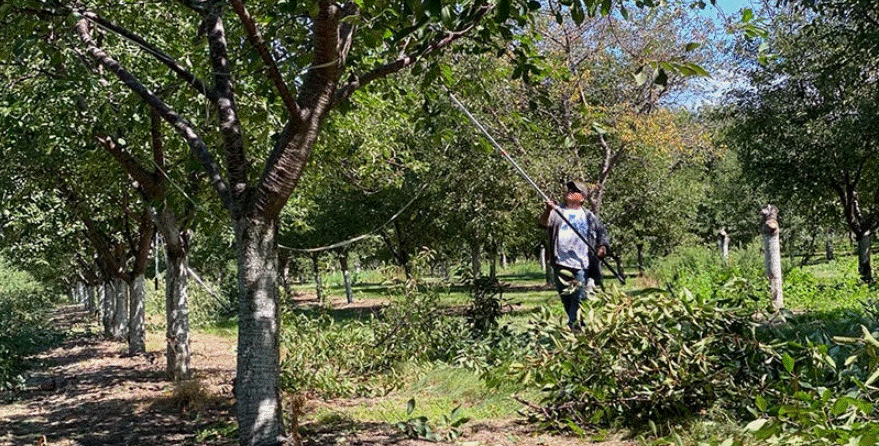Aug 18, 2023Wolverine State growers pressed by AEWR, labor challenges
Just this year, four growers mowed their asparagus fields and are leaving the industry.
Because of untimely weather?
Poor crop prices?
Input costs?
No. Because of low labor availability and an unaffordable rising Adverse Effect Wage Rate (AEWR), said Sarah Black, general manager of Great Lakes Ag Labor Services (GLALS), an affiliate of MFB helping farms to secure legal temporary guestworkers.

“They’re getting rid of all of their vegetable entities and sticking with fruit or going back to just row crops because it’s simple math, and it just doesn’t work with the government mandated AEWR that’s too expensive for what they can sell vegetables for,” Black said.
At the farm level, a high percentage of food production now is planted, cared for and harvested by legal foreign guestworkers, according to Black, who said the nation has a decision to make.
“Do we want to continue our food production in the U.S. — that security of our production here on U.S. soil under our food safety laws and regulations — or are we OK with importing our food and not growing as much anymore?” Black said.
“If we want to keep it, then we better quickly get focused on ag labor reform and modernizing the H-2A program.”
This year Michigan’s AEWR rose almost 13% to $17.34. AEWR is determined by the USDA’s Farm Labor Survey, which uses the combined wage rate of field and livestock workers and is the centerpiece for calculating the required hourly pay rate for H-2A. Economists say that the wage rate could approach $25 to $30 in the next 10 years — if reform isn’t done.
On Nov. 2, MSU will host a conference, Understanding and Addressing Agricultural Labor Challenges in the United States, to discuss wage rates, farm-work mechanization, and policy solutions, among other items. It runs 8 a.m. to 5 p.m. at the MSU University Club, with the nation’s leading ag labor economists, experts, industry representatives, and local and governmental officials in attendance.
Register here.
“Agriculture is unique in terms of the broader immigration debate because immigrant workers in agriculture are not really competing with American-born workers,” said Zach Rutledge, assistant professor in MSU’s Department of Agricultural, Food, and Resource Economics, and host of the upcoming conference.
“The conference will convene stakeholders, both national and locally, to have a conversation about not only AEWR, but what are the challenges our stakeholders are facing, and what are some of the solutions.”
According to American Farm Bureau Federation data, labor accounts for nearly 40% of total production costs on some farms.
![]() “It’s really about how do we keep our family farms in businesses, and our food production here in the U.S. If this is their last option for a labor source that can help sustain their farm, yet they can no longer afford the government-dictated wage,” Black added.
“It’s really about how do we keep our family farms in businesses, and our food production here in the U.S. If this is their last option for a labor source that can help sustain their farm, yet they can no longer afford the government-dictated wage,” Black added.
“When that farm goes out of business, that production will never come back.”
At a time when many growers are experiencing average- or below-average returns, Black said many of them are pivoting to other crops or technology.
“But technology will never be a one-for-one replacement for labor,” Black noted.
“However, it is part of the solution, so the question is, can technology get to the marketplace quick enough for where we’re at with the current labor shortages, before that farm goes out of business?
While several legislative proposals have been introduced this session, there has not yet been any Congressional action, according to MFB National Legislative Counsel John Kran.
“We are continuing to pressure lawmakers to find even small, surgical fixes to help take pressure off of growers,” Kran said. “We can’t afford to wait any longer.”
Earlier this summer, House Ag Committee leadership appointed a bipartisan group of members of the committee to help find additional solutions to address workforce needs. They are meeting regularly, and Kran said Farm Bureau and partners continue to share policy proposals with them.
“We need farmers to continue sharing their story with our lawmakers — they need to hear specifically how inaction on this fundamental policy issue is hurting their livelihoods,” Kran added.
The last time ag labor reform legislation passed in Congress was 1986.
“We need to keep trying to do something,” Rutledge said.
“This is really an issue that we need to be thinking about in terms of the security of our nation and what this means for the long-term stability of our country.”
-Story courtesy Mitch Galloway, Michigan Farm Bureau Farm News Media
















